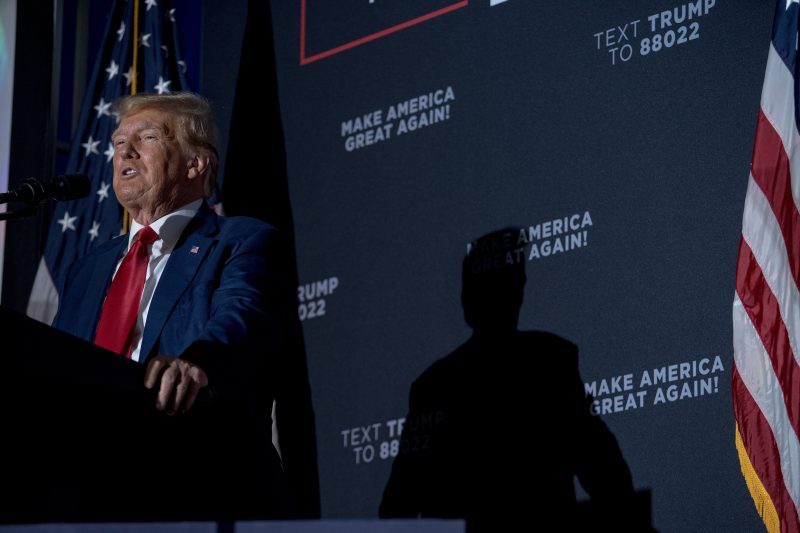Donald Trump left the presidency with the lowest average approval rating for a tenure in modern history, at 41 percent. One reputable poll showed him bottoming out at 29 percent after Jan. 6, 2021.
That same former president is now looking like a favorite to reclaim the White House just four years later, leading in virtually every recent poll (albeit often within the margin of error).
There are multiple reasons for this, and they start with President Biden’s own problems. But could they also have to do with Americans’ short political attention spans?
Some Trump critics have wagered that the recent polls could reflect a bit of amnesia when it comes to how Americans once felt about Trump — and, its proponents hope, a temporary bout of it. The idea is that Biden’s 2020 supporters can be brought back into the fold when the chaos and controversy of 2017-through-2021 years come back into focus during the 2024 campaign, as well as Trump’s criminal trials.
There is surely some wishfulness involved, but it’s not totally unreasonable.
It’s long been evident that one of the best things a president can do to improve his image is leave. President after president has departed to find Americans suddenly holding him and his tenure in higher regard.
George W. Bush is a recent case in point. His approval rating on Election Day 2008 was just 25 percent, according to Gallup. But two years later, the same pollster showed that nearly twice as many Americans (47 percent) said they approved of his presidency. Nearly 6 in 10 now approve.
This is a particularly pronounced example, but Gallup’s data show every former president dating to John F. Kennedy is more popular today than he was upon leaving office. And since Ronald Reagan, every president except Bill Clinton became more popular the first time Gallup conducted what it calls its “retrospective approval” poll — usually conducted about two years after the presidents leave office. Barack Obama and both George Bushes saw their approval ratings jump by double digits.
Trump has certainly benefited less from this dynamic than his predecessors. Gallup this summer pegged his first retrospective approval rating at 46 percent, compared with the 43 percent when he was booted from office.
But that 46 percent was still higher than any average approval rating Trump enjoyed during his presidency, including during his brief honeymoon period in early 2017.
The other recent poll to test Trump’s retrospective approval rating was a Washington Post-ABC News poll, which in September also pegged his approval higher than it was at any point in his presidency: 48 percent. (This was one of Trump’s best polls and seemed to be an outlier at the time, but it’s what we have.)
The other way to gauge how views of Trump might have improved is his favorable rating. This is more a view of the man than his job performance, but it’s more regularly tested for former presidents.
Again, Trump hasn’t seen a huge bump but has seen improvement. His most recent average favorable rating from FiveThirtyEight is 41.9 percent. That’s higher than at any point since he left office.
The questions from there are whether even these modest apparent improvements are truly about people forgetting — versus, say, genuinely warming to Trump — and could, accordingly, prove temporary.
One of the reasons former presidents’ images tend to improve is that they fade from the spotlight. Basically, absence makes the heart grow fonder.
But while Trump isn’t as ever-present in American lives as he once was, he has hardly faded away like a normal ex-president. And there has seemingly been plenty to remind people about his liabilities over the past three years — from impeachment to the Jan. 6 committee to, currently, his criminal indictments.
At the same time, these are developments that large swaths of swing voters aren’t tracking very closely. Polling shows as many as one-third of Americans acknowledge they don’t understand Trump’s criminal charges very well. (Plenty of others could be overselling their awareness.) Lots of Republicans, in particular, appear woefully unfamiliar with the basic underlying facts.
Most Republicans do at least, though, say Trump did something wrong in one of his criminal cases. A majority of Americans overall believe Trump broke the law. And a near-prohibitive number of Americans say Trump being convicted would effectively disqualify him; the big recent New York Times-Siena College poll showed a five-point Trump lead in key swing states becoming a 10-point deficit if Trump were convicted.
All of which suggests that views of Trump could dim as the 2024 general election refocuses things on him and his presidency. Democrats can feel somewhat optimistic about a reversion to the mean if they can message this effectively.
Whether it would be enough is another matter — particularly given that the incumbent president is about as unpopular as Trump was during his White House tenure.

